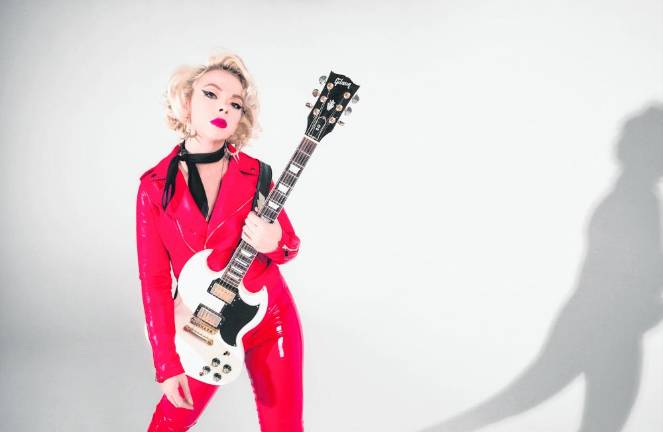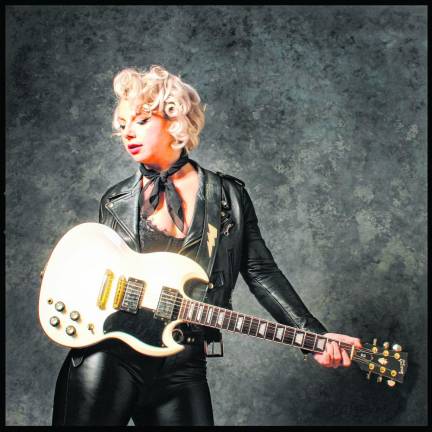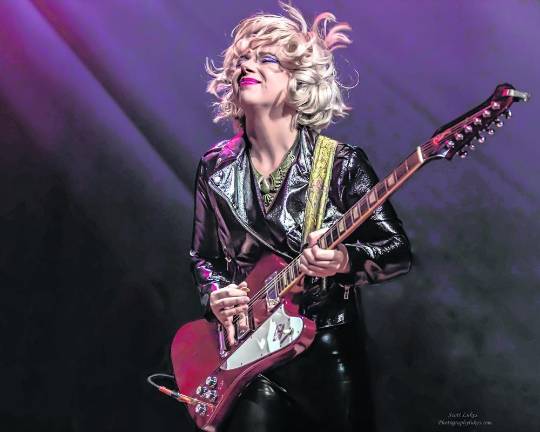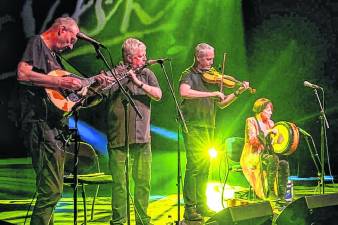


Stefani M.C. Janelli interviews singer-songwriter and blues guitarist Samantha Fish before her Bulletproof Tour 2024 stop Sunday, March 17 at the Newton Theatre.
Question: You’re on the road for your own tour, but earlier this year, you performed at Eric Clapton’s Crossroads Guitar Festival in California. It was my first time catching one of your shows, and it was a captivating performance. What was your favorite part about playing this legendary concert with the best of the best guitarists?
Answer: It was incredible. It’s an event that I’ve looked at for years. Every lineup that would come out was truly the best of the best. To be included in that number, it’s a massive honor. Not to give an obvious answer, but my favorite part was playing. It was in the Crypto Arena - the energy would be hard to match anywhere. It’s also an action-packed festival, so it all happened really fast. I feel like just as quickly as we got up there, we were done. I got to meet a lot of great people. It’s something I will remember forever.
Q: Your work spans multiple genres, but you’re best known for being a blues artist. As a female guitarist in a male-dominated genre, what are the biggest challenges you’ve faced and how have you overcome them?
A: There are more women in the industry and genre now, which has definitely helped, but there are still challenges. Early in my career, I had to combat a lot of negativity, which caused uncertainty within myself. Just not knowing how to present what I was doing without criticism. How you dress: too sexy, not sexy enough. Your looks, talent and personality are all picked apart. Then you’re labeled with words like gimmick and novelty, all because you’re a woman who chose to pick up an instrument. Just being labeled a female guitar player, it’s silly. We don’t need that label, but for some reason, everyone needs to consolidate what you’re doing with your gender. It doesn’t happen the other way around. I could go on and on ... pay gap, festival quotas, representation, artists being pitted against one another. It can be an ugly business. I think the only way to overcome it is to just keep playing. Drown out the noise with your own music. Keep showing up. Support your friends. Get used to criticism and use it as fuel. I had to get tougher and stop caring what others thought. The world needs more women in music. Representation is key to inspiring the new generation to pick up instruments. My heroes made it a better world for me. We all deal with something so the next line of artists have an easier time finding acceptance.
Q: Who would be on your Guitar Hero Mount Rushmore?
A: I love Mike Campbell. I’ve said it for years. He’s written some of the most iconic guitar solos and riffs. Understated, tasteful, melodic. B.B. King is so emotive. There’s a tenderness to his playing. There’s a call and response to his voice. It’s all conversational. Keith Richards doesn’t even need a justification. It’s Keith Richards. And I love North Mississippi Delta music, so I gotta put R.L. Burnside up there too. He’s someone who’s taken the blues to different places and pushed the genre. And a lot of those recordings are so over the top, I’m just a big fan.
Q: What do you think sets you apart the most as a guitarist?
A: Hard to say. I’m just doing what feels right. I try to keep it as melodic as possible. It’s OK to work within blues scales and riffs, but you also have to push out of that as well. Find something to say. My thing is unique to me. It’s my voice. I can only play like me. I’ve never been a great mimic. I might try to learn a song to sound like someone else, but I always just end up sounding like me. I learned a lot from great players who use the guitar as a call and response to their vocals. My favorite guitar players make the guitar sound almost like a human voice: emotive, conversational. I try my best to keep that at the forefront of my playing as well.
Q: What is one riff or guitar solo you wish you had written?
A: I’d want to write something that gets reused over and over through different songs over time. Etta James’ “I’d Rather Go Blind” comes to mind. It’s not really a guitar riff, so I know this isn’t a typical response. But these changes and the vibe of the song were used with Chris Stapleton’s cover of “Tennessee Whiskey.” Timeless and unique. Something like that inspires more people down the line.
Q: For your latest record, “Death Wish Blues,” you collaborated with Jesse Dayton. He’s worked with so many legendary acts, such as Johnny Cash and Willie Nelson. What was it like working with Dayton on this project?
A: Jesse can cast a wide net. He’s a versatile artist. He likes to push boundaries just like I do. We set an intention with this record. We wanted a certain style and sound. We just kept referring back to our initial intention after we’d write together. I think we both brought out the best in each other.
Q: Right now you’re on your Bulletproof Tour 2004. Do you have a favorite city to perform in?
A: The big cities are always fun. I love NYC. It’s unique, and the energy is incredible. I love historic venues, places my heroes have played. That always sets the bar high. I’m a tourist at heart, so I love to explore new places. But honestly, everywhere you go, it’s all about the crowd. I could be playing MSG (Madison Square Garden), but if the audience isn’t responsive or giving some of that energy back, it’s hard to get to those extra magic moments. Small towns, big towns. It’s all about the people.
Q: What has been your favorite part of this tour? Do you have a favorite part of your live set or a new favorite song to play?
A: We’ve been reimagining some of the older material. It’s been cool to revisit that. Most tours in my career at this point have been centered around a new record, so this is unique for me. I get to work on different things. It’s great to go back and relate to the songs you wrote years ago in a whole new way. I love playing “Dream Girl.” I have for a while. We take it from the floor to the ceiling dynamic-wise.
Q: On Sunday, you will be making a stop at the Newton Theatre. What songs can we expect in the setlist?
A: I don’t want to give too much away, but I will pick the songs that lend themselves to the best live experience. This is always how I choose songs for shows. It’s about the trip we want the audience to go on. I try to pick some of my favorites, some of the fan favorites and then the rest is all just making the best night of music possible. I hope to accomplish that.
